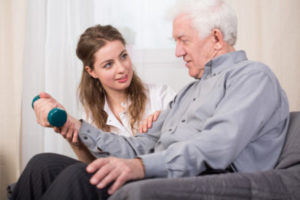The number of times I have been told by total strangers “your thumbs must hurt you from massaging people,” “what do you do other than massage?” and “I need a physio to give me a good massage.” My response to them is “that’s not the sort of physio I do.” They tend to look at me oddly and question me further. So let me tell you what I actually do. I provide physiotherapy to the elderly, yes, to people who are even in their 80s, 90s, and 100s.
Imagine how you’d feel if you were living alone and you were scared of standing up and walking to the toilet in case you had a fall. Imagine how you’d feel if you actually had a fall, couldn’t get up off the floor and you were stuck. This happens more often than you think. Research by Age UK shows that a third of all people aged over 65 fall each year, with higher rates among those over 75. Falls represent over half of hospital admissions, and for those who break their hips? Half of them never regain their former level of mobility. A shocking statistic is that one in five people die within three months just for breaking their hip. Yes, these awful statistics reflect that something needs to be done to help them.

So you are probably wondering what it is I do to help these people as a physiotherapist. The answer is that I run an organisation, which goes to the homes of the elderly. I ask them plenty of questions to determine why I think they’re falling and then try to solve these problems. Is it because they are physically weak and are unbalanced on their feet? Is it the fact that they are tripping over their rugs at home? Or is it because their vision is so poor that they can’t see where they’re going and subsequently fall? And what happens when they do fall, are they stuck on the floor for hours or do they press their pendant alarm, which sits around their neck or wrist? Having these sorts of questions in my mind helps me work out what treatment they need.
Other than massage, which is just one type of treatment that physiotherapists provide, I do things like balance and strengthening exercises with them. Yes I give the elderly dumb bells and ankle weights but they might only be 1 or 2 lbs in weight. I check their home environment for any hazards that might put them at risk of falling, as I said like rugs or specific furniture like their wheely computer chair that they have had for years longer than I have lived. I advise them on what I think they should put aside and suggest equipment that might make their life so much easier. You’d be surprised, but simple things like placing blocks under the sofa to raise it makes all the difference to them and gives them their independence back. Magically they can stand up on their own rather than needing assistance from family members and carers. Checking their walking aids and trialling out new ones can be a blessing for them. I could go on forever more, but I think I shall leave it there.
Next time you see your parents or grandparents, please take a moment to think about whether they could do with having physiotherapy, not just to have a massage but to give them their lives back.
Written by Hily Perpinyal, Chartered Physiotherapist
